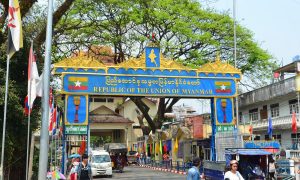Thailand’s government says that it plans to intensify its war on online scam operations across the border in Myanmar, requesting arrest warrants for figures known to be involved with criminal syndicates and planning further restrictions on exports to areas where these syndicates are known to operate.
According to a report yesterday in the Bangkok Post, Chatchai Bangchuad, the secretary-general of the National Security Council, told the press that the current anti-scam measures would be “maintained and extended.”
Among the measures that could soon be introduced were the suspension of solar panel exports to Myanmar, which had been proposed by the Commerce Ministry, and controls on oil and cooking gas exports, he added.
Deputy Prime Minister and Defense Minister Phumtham Wechayachai added that people suspected of links to the gangs would be kept way from border areas near scam centers, and prohibited from entering Myawaddy, a major scamming hub across from the town of Mae Sot in Tak province.
Separately this week, Thailand’s Department of Special Investigation (DSI) announced that it had requested arrest warrants for Col. Saw Chit Thu, Lt. Col. Mote Thone, and Maj. Tin Win, three leaders of the Karen Border Guard Force (BGF), the militia that controls Myawaddy, presenting evidence of their involvement in human trafficking. The BGF has coordinated the development of Shwe Kokko, a notorious scam hub in Myawaddy, and there is considerable evidence that it is involved with the scam syndicates based there. (The BGF has denied any involvement in scamming activities, and last week handed over 61 trafficked victims from seven foreign countries to Thai authorities.)
Thai authorities have also removed Police Maj. Gen. Ekkarat Intasuep, commander of Inspection Division 5, and Police Maj. Gen. Samrit Aemkamol, chief of police for Tak Province, from their posts for “allegedly having connections to online gambling and scam centers in Myawaddy and failing to stem their cross-border activities,” according to a report in The Irrawaddy.
The past five years have seen an alarming rise in scamming operations in the Mekong region, which have defrauded thousands of victims around the world while trafficking tens of thousands of people to work in the centers. Scamming operations have become an issue of public debate in Thailand since the Chinese actor Wang Xing, 22, went missing on January 3 near the Thailand-Myanmar border. Wang was rescued on January 7 from a scam center in Shwe Kokko. The case, which attracted considerable media attention in both Thailand and China, has prompted the Chinese government to increase its pressure on the Thai government to take more concerted action to combat scamming syndicates that have cropped up in bordering areas of Myanmar, Laos, and Cambodia.
Last week, following a reportedly tense visit by Liu Zhongyi, China’s assistant minister of public security, the government ordered the Provincial Electricity Authority to cut power to three areas where scamming gangs are known to operate: Myawaddy, Payathonzu, opposite Three Pagodas Pass in Kanchanaburi province, and Tachileik, opposite Mae Sai district in Chiang Rai province. During meetings with his Thai counterparts, Liu said that that there are 36 major Chinese scamming gangs operating in the region, which “employed” more than 100,000 people – most of them trafficked people who were forced to run scams.
Despite Phumtham saying that the power cuts had had a “significant impact” on the gang’s activities, their true impact remains unclear. The government of Laos has reportedly dispatched power to Tachileik, which is close to the nation’s short border with Myanmar’s Shan State, while anecdotal evidence suggests that the scamming compounds in Myawaddy have found ways to keep the lights on, despite most of the rest of the city being plunged into darkness.
Indeed, this was the subject of a small protest against the Thai cuts by Myawaddy residents over the weekend, which called for boycotts on Thai goods and aimed to impede traffic across the border. As the Post reported, the residents claim that the scamming syndicates have the resources to purchase generators to make up for the shortfall in power, but that the cuts have caused hardship for households and small businesses inside Myanmar. (It remains unclear whether the protest was an “organic” occurrence or was staged by the BGF or junta authorities.) Panicked motorists in the city have also flocked to petrol stations to stock up on fuel ahead of expected shortages.
On Monday, Phumtham said that Prime Minister Paetongtarn Shinawatra’s administration would not be swayed by the protests. “They should think carefully, because they depend on consumer goods from Thailand. Without that food, they would have to take care of themselves,” he said. “We stand firm on these measures. Our focus is on the problem facing Thailand. This issue must be solved decisively.”
The continuing Thai actions suggest that it has belatedly woken up to the seriousness of the threat, as well as the possible collusion of local Thai authorities in the criminal activities in the border region. The question now is whether it can sustain this effort, and shift its approach when the criminal syndicates inevitably begin to adapt to their restrictions – as reports suggest they have already begun to do.

































